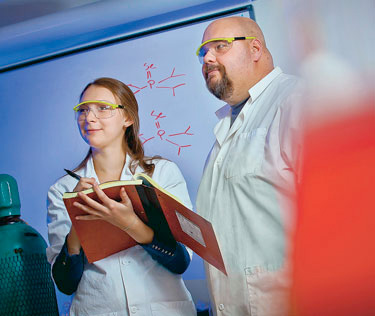From Shaky Ground to Graduate School: A Mentor Made the Difference
By Chelsea Mandell ’12
I excelled in math and science in high school, but had little idea of what to major in at college. Then I visited Geisinger Medical Center with my grandfather for his oncology appointment and overheard laboratory scientists and technicians in their white lab coats talking in line behind me. I wanted to be the one in the lab coat talking about the day’s results. I told my grandfather that I was going to major in chemistry.
I entered Lafayette intending to major in biochemistry and become a medical laboratory scientist. These thoughts soon began to waver. Having perfectionist tendencies, I expected ideal results. After two semesters of not getting ideal results (despite receiving A’s), I felt anxious in lab, blaming myself for anything that went wrong. I began to doubt my choice of majors.

Chelsea Mandell ’12 (left) and Chip Nataro, associate professor of chemistry.
It was one of the best decisions of my life. Working with Dr. Chip Nataro in inorganic chemistry has taught me valuable lessons: public speaking isn’t that bad, experiments rarely go as planned, setbacks can be dealt with. Most important, I’ve learned I absolutely love working in the lab.
One of our fi rst conversations was about my fear of public speaking. Dr. Nataro said, “I’ll make sure you get over that.” After a few presentations for the chemistry department and outside speakers, I was ready to take on the American Chemical Society conference in San Francisco, where I presented a poster that has been published in Inorganic Chemistry with me as first author. I also co-presented on the benefits of undergraduate research. Since then, another manuscript I co-authored has been accepted by the Journal of Organometallic Chemistry.
I have continued to work in the Nataro lab, including my senior thesis project. The only break was last summer when I interned at one of Geisinger’s medical research laboratories. Growing cell cultures, harvesting mouse organs, and conducting RNA isolations were enjoyable, but I missed transition metal chemistry. So I’ve decided to focus my graduate school studies on inorganic chemistry.
After receiving a Ph.D., I am considering a few options — working in the pharmaceutical industry to help create medications for cancers that took the life of my grandfather and so many others; or working within a hospital laboratory, which first inspired me to major in biochemistry; or a life in academia to become an influential mentor as Dr. Nataro is to me.